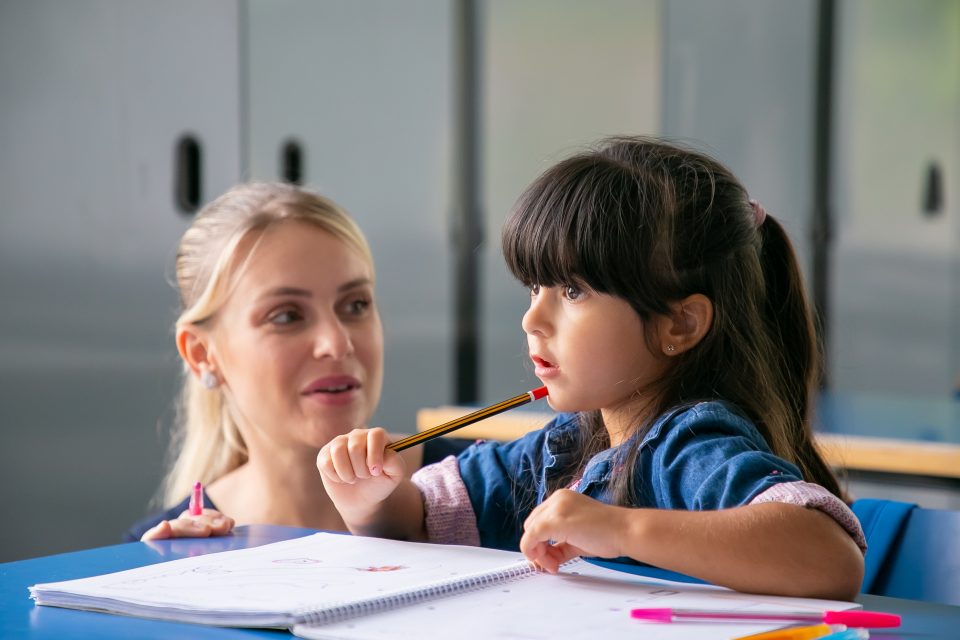At Jakarta Intercultural School, individualised learning is at the heart of every classroom
No two children are alike, and this is especially true for the way they learn and develop their foundational skills. While most will be able to follow the developmental milestones of their age group at their own pace, some may need additional support and attention. Thanks to critical advancements made in special education, schools are making more room in their curriculum to cater to students with various learning differences.
“The brain develops in different ways […] Children and adolescents are very diverse, and their neurodiversity — their ability to have strengths in their learning and areas that they need to grow on — is probably seen in most of us. What is more pronounced is that there is a subset of children who may need support for a while to help them develop certain foundational skills,” explained Maya Nelson, the interim head of school at Jakarta Intercultural School (JIS) and an expert in special education with three decades of experience as an international educator.
“And then there are children who may learn differently and who may need support for a longer time.”
Understanding the importance of providing a truly inclusive learning environment for students of various developmental challenges, JIS employs a Support Services Team (SST) of specialists who are dedicated to supporting the needs of every individual child, from Early Years (EY) up to Grade 12 in high school.
The terms used to describe what these children experience have evolved as our understanding of neurodevelopment grows. Perhaps the most commonly known is “learning difficulty”, but growing in prevalence are learning needs, neurodiversities and learning differences.
“This includes children […] who are on the autism spectrum, who have speech and language needs, who may need support with learning because of motor difficulties or motor delays, as well as students who may have a hearing impairment or visual impairment,” Nelson said.
Many schools now have dedicated professionals who are able to work with all of these diversities, Nelson added, “with the main goal of supporting children in the development and acquisition of skills so they can succeed in school”.
“The beauty of a program like the [JIS SST], the beauty of having different minds think about what works for children and adolescents as they grow and develop in their academic skills and other skills is that they have different perceptions and different understandings of how neurology evolves over time, how motor skills evolve over time, how the body develops and how to best support those needs,” she said.
The SST at JIS comprises learning specialists, speech and language therapists, occupational therapists, school counsellors and a psychologist. They work closely as a cohesive team and with teachers and parents to monitor students who may show signs of delay or struggles in their learning or developmental milestones, then analyse their needs and strategise an individualised treatment plan.
“What happens for one child can be very different from what happens for another,” Nelson said, emphasising that some children may simply need more time acquiring a specific skill, some require only short-term support, while others may need consistent treatment in the long term.
She pointed to disfluency — or what is perhaps better known as stuttering — as an example, explaining that repetitions or disruptions in speech were typical for certain ages. If the behaviour continues, especially beyond the age of 5, the child may need the help of a speech therapist.
Other difficulties that may manifest at an early age include language and speech delays, motor difficulties and different attentional patterns. As the child progresses through elementary school, they may have trouble with reading or mathematics, serious signs of which may indicate dyslexia or dyscalculia.
At this stage, Nelson said, greater attention is needed from both parents and teachers as children have the ability to adapt and use various strategies — both consciously and instinctively — to essentially cover up their learning difficulties.
“Some kids are so adept at using their strengths to overcome that they can hide the things that are difficult. For example, children who are very bright, curious kids who might be dyslexic — have a reading disability — can fake it through school because they know enough, have enough thinking skills, have enough knowledge to pretend [reading] through a book or through a page.”
Parent participation and vigilance, therefore, are also crucial. As a parent herself, Nelson said she understood that the process of being able to see or accept your child may have extra needs can be scary.




